Current Affairs 27 Sep 2023
Today’s News
Judiciary is losing talent as govt. sits on names: SC
(Current Affairs 27 Sep 2023 |Relevant for GS paper-2)
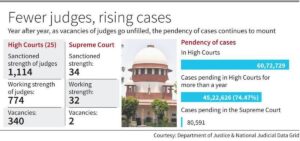
- The Supreme Court on Tuesday said the judiciary was losing fresh talent as never before because prospective candidates shortlisted for judgeships in the High Courts give up as months tick by without a decision from the government on their appointment.
- Many a bright legal mind, willing to sacrifice their law practice to join the Bench, have fallen victim to segregation of names by the government, who seemingly prefer one name to the other for unknown reasons, a Bench of Justices Sanjay Kishan Kaul and Sudhanshu Dhulia noted.
Refresh to basics
Collegium system
It is the system of appointment and transfer of judges that has evolved through judgments of the SC, and not by an Act of Parliament or by a provision of the Constitution.
Evolution of the System:
First Judges Case (1981):
- It declared that the “primacy” of the CJI’s (Chief Justice of India) recommendation on judicial appointments and transfers can be refused for “cogent reasons.”
- The ruling gave the Executive primacy over the Judiciary in judicial appointments for the next 12 years.
Second Judges Case (1993):
- SC introduced the Collegium system, holding that “consultation” really meant “concurrence”.
- It added that it was not the CJI’s individual opinion, but an institutional opinion formed in consultation with the two senior-most judges in the SC.
Third Judges Case (1998):
- SC on the President’s reference (Article 143) expanded the Collegium to a five-member body, comprising the CJI and four of his senior-most colleagues.
Who Heads the Collegium System?
- The SC collegium is headed by the CJI (Chief Justice of India) and comprises four other senior most judges of the court.
- A High Court collegium is led by the incumbent Chief Justice and two other senior most judges of that court.
- Judges of the higher judiciary are appointed only through the collegium system and the government has a role only after names have been decided by the collegium.
What are the Procedures for Judicial Appointments?
For CJI:
- The President of India appoints the CJI and the other SC judges.
- As far as the CJI is concerned, the outgoing CJI recommends his successor.
- In practice, it has been strictly by seniority ever since the supersession controversy of the 1970s.
For SC Judges:
- For other judges of the SC, the proposal is initiated by the CJI.
- The CJI consults the rest of the Collegium members, as well as the senior-most judge of the court hailing from the High Court to which the recommended person belongs.
- The consultees must record their opinions in writing and it should form part of the file.
- The Collegium sends the recommendation to the Law Minister, who forwards it to the Prime Minister to advise the President.
For Chief Justice of High Courts:
- The Chief Justice of the High Court is appointed as per the policy of having Chief Justices from outside the respective States.
- The Collegium takes the call on the elevation.
- High Court judges are recommended by a Collegium comprising the CJI and two senior-most judges.
- The proposal, however, is initiated by the outgoing Chief Justice of the High Court concerned in consultation with two senior-most colleagues.
- The recommendation is sent to the Chief Minister, who advises the Governor to send the proposal to the Union Law Minister.
Balsams in full bloom add to visual treat in Munnar
(Current Affairs 27 Sep 2023 | Relevant for Prelims)
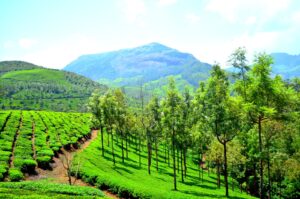
- Presenting a visual feast to tourists, balsams (genus Impatiens) are in full bloom in Munnar. Called Kasithumba and Onappovu locally, its small, pink flowers are a major attraction along the Devikulam stretch of the Kochi Dhanushkodi National Highway.
- Balsams are also known as ‘touchmenot’ because of the bursting of mature seeds and seed distribution. Botanists say the large-scale flowering of balsams indicates that microclimate is still active in th–e Munnar hill station.
- Of the 220 balsam species in India, 135 are found in the southern Western Ghats.
Refresh basics
About Impatiens balsamina
- It is commonly known as balsam, is a species of plant native to India and Myanmar.
- Different parts of the plant are used as traditional remedies for disease and skin afflictions.
- Juice from the leaves is used to treat warts and snakebite, and the flower is applied to burns.
- This species has been used as indigenous traditional medicine in Asia for rheumatism, fractures, and other ailments.
With climate change, tackling new disease scenarios
(Current Affairs 27 Sep 2023|Relevant for GS Paper-3)

- In its latest report released this March, the Intergovernmental Panel on Climate Change (IPCC) delivers a stark warning: climate change heightens the global risk of infectious diseases.
- The close relationship between climate and disease is being demonstrated every year. For instance, the periodicity of mosquito borne disease outbreaks no longer follows expected patterns. Dengue manifests in two to three peaks throughout the year. Variability in temperature, precipitation, and humidity disrupt disease transmission cycles.
- Habitat loss forces disease carrying animals to encroach upon human territory, increasing the risk of human animal interaction and the transfer of pathogens from wildlife to humans. Viruses which do not harm animals can be fatal for humans.
- Nipah virus, which has been causing outbreaks in Kerala for many years now, is a good example. An analysis of 2022 published in Nature Climate Change warns that humans now face a broader spectrum of infectious agents than ever before. Over half of all known infectious diseases threatening humans worsen with changing climate patterns.
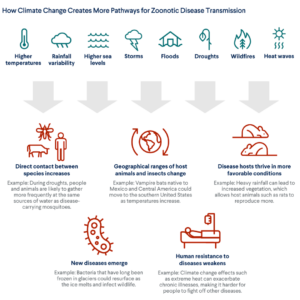
- Diseases often find new transmission routes, including environmental sources, medical tourism, and contaminated food and water from once reliable sources. While ecosystems shape local climates, climate change is transforming ecosystems.
- Human induced climate change is unleashing an unprecedented health vulnerability crisis. India, in particular, has felt the ominous impact, with early summers and erratic monsoons causing water scarcity across the Gangetic plains and Kerala.
- These climatic shifts are manifesting in severe health crises, including a dengue epidemic in Dhaka (Bangladesh) and Kolkata and the Nipah outbreak in Kerala.
- Changed disease scenarios require a revision of strategies to detect and deal with them. Over the past two decades, India has improved its reporting of outbreaks. The Integrated Disease Surveillance Programme (IDSP) was rolled out in a few States in 2007.
- From reporting 553 outbreaks in 2008, it last reported 1,714 in 2017. It was phased out in favour of a new, a web enabled, near real time electronic information system called Integrated Health Information Platform (IHIP). IHIP was launched in seven States in 2018. It added 20 additional disease conditions over IDSP’s 13 and could present disaggregated data to its users.
- The current design of surveillance is not adequate for the emerging disease scenario. Mitigating the spread of climate change induced diseases requires safeguarding ecosystems, curbing greenhouse gas emissions, and implementing active pathogen surveillance.
- A unified approach, termed One Health which integrates monitoring human, animal, plant, and environmental health, recognises this interconnectedness. This approach is pivotal in preventing outbreaks, especially those that originate from animals.

- India must launch One Health and infectious disease control programmes by building greater synergies between the Centre and States and their varied specialized agencies. Animal husbandry, forest and wildlife, municipal corporations, and public health departments need to converge and set up robust surveillance systems.
- More importantly, they will need to build trust and confidence, share data, and devise logical lines of responsibility and work with a coordinating agency. So far, the Office of the Principal Scientific Adviser to the Prime Minister has been taking this lead but with new World Bank and other large funding in place, this will need greater coordination and management.
- Globally, there is an obsession with the enigmatic “disease X,” but it is the familiar annual cycles of known agents such as influenza, measles, Japanese encephalitis, dengue, diarrhoea among others that will continue to test the public health system.
- The re-emergence of Nipah in Kerala is a wakeup call, that mere biomedical response to diseases is inadequate. In the face of a changing climate and the growing threat of infectious diseases, protecting ecosystems, fostering collaboration, and embracing the One Health paradigm are our best defences.
AFSPA to stay in Nagaland, Arunachal
(Current Affairs 27 Sep 2023 |Relevant for Prelims, GS paper-2)

- The Home Ministry on Tuesday extended the Armed Forces (Special Powers) Act (AFSPA) in parts of Nagaland and Arunachal Pradesh for six months from October 1.
- According to a notification, the AFSPA has been extended in eight districts and in the areas under 21 police stations in five other districts of Nagaland.
Refresh Basics
AFSPA
- A reincarnation of the British-era legislation that was enacted to quell the protests during the Quit India movement, the AFSPA was issued by way of four ordinances in 1947.
- The ordinances were replaced by an Act in 1948 and the present law effective in the Northeast was introduced in Parliament in 1958 by the then Home Minister, G.B. Pant.
- It was known initially as the Armed Forces (Assam and Manipur) Special Powers Act, 1958.
- After the States of Arunachal Pradesh, Meghalaya, Mizoram, and Nagaland came into being, the Act was adapted to apply to these States as well.
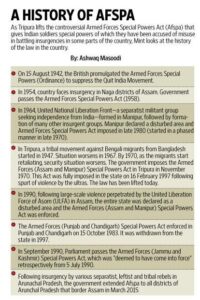 About:
About:
- The AFSPA gives unfettered powers to the armed forces and the Central armed police forces deployed in “disturbed areas” to kill anyone acting in contravention of law and arrest and search any premises without a warrant and with protection from prosecution and legal suits.
- The law first came into effect in 1958 to deal with the uprising in the Naga
- The Act was amended in 1972 and the powers to declare an area as “disturbed” were conferred concurrently upon the Central government along with the States.
- Tripura revoked the Act in 2015 and Meghalaya was under AFSPA for 27 years, until it was revoked by the MHA from 1st April 2018.
- Currently AFSFA is in some parts of Assam, Nagaland, Manipur and Arunachal Pradesh.
NHRC seeks action taken report on welfare of trans persons from govt.
(Current Affairs 27 Sep 2023 |Relevant for GS Paper-2)
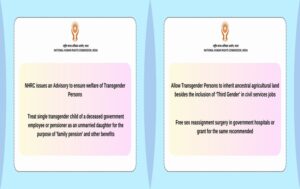
- The National Human Rights Commission (NHRC) on Tuesday issued an advisory to the Centre, State governments and Union Territory administrations to ensure the welfare of transgender persons.
- The commission has observed that one of the primary concerns of trans persons in the country is that despite legal reforms, they continue to grapple with discrimination, leading to employment disparities, limited access to healthcare, and exclusion from social circles.
- It also recommended that transgender persons be allowed to inherit ancestral agricultural land. A multipurpose identity card may be provided to the people of this community to help them access government schemes and other benefits.
Refresh to basics
NHRC
- NHRC of India is an independent statutory body established on 12 October, 1993 as per provisions of Protection of Human Rights Act, 1993, later amended in 2006.
- NHRC has celebrated its Silver Jubilee (25 years) on October 12, 2018. Its head quarter is located in New Delhi.
- It is the watchdog of human rights in the country, i.e. the rights related to life, liberty, equality and dignity of the individual guaranteed by Indian Constitution or embodied in the international covenants and enforceable by courts in India.
- It was established in conformity with the Paris Principles, adopted for the promotion and protection of human rights in Paris (October, 1991) and endorsed by the General Assembly of the United Nations on 20 December, 1993.
Members
- Key Members: It is a multi-member body consisting of a chairperson, five full-time Members and seven deemed Members.
Chairman
A person who has been the Chief Justice of India or a judge of the Supreme Court can become a chairman.
- Appointment: The chairman and members are appointed by the President on the recommendations of a six-member committee consisting of the Prime Minister as its head, the Speaker of the Lok Sabha, the Deputy Chairman of the Rajya Sabha, leaders of the Opposition in both the Houses of Parliament and the Union Home Minister.
- Tenure: The chairman and members hold office for a term of three years or until they attain the age of 70 years, whichever is earlier.
The President can remove the chairman or any member from the office under some circumstances.
- Removal: They can be removed only on the charges of proved misbehaviour or incapacity, if proved by an inquiry conducted by a Supreme Court Judge.
- Divisions: Commission also has five Specialized Divisions i.e. Law Division, Investigation Division, Policy Research & Programmes Division, Training Division and Administration Division.
Powers
- It has all the powers of a civil court and its proceedings have a judicial character.
-
- NHRC investigates grievances regarding the violation of human rights either suo moto or after receiving a petition.
- It has the power to interfere in any judicial proceedings involving any allegation of violation of human rights.
- It is empowered to utilise the services of any officer or investigation agency of the Central government or any state government for the purpose of investigating complaints of human rights violation.
- It can look into a matter within one year of its occurrence, i.e the Commission is not empowered to inquire into any matter after the expiry of one year from the date on which the act constituting violation of human rights is alleged to have been committed.
- The functions of the commission are mainly recommendatory in nature.
- It has no power to punish the violators of human rights, nor to award any relief including monetary relief to the victim.
- It has limited role, powers and jurisdiction with respect to the violation of human rights by the members of the armed forces.
- It is not empowered to act when human rights violations through private parties take place.
- It can visit any jail or any other institution under the control of the State Government to see the living conditions of the inmates and to make recommendations thereon.
- It can review the safeguards provided under the constitution or any law for the protection of the human rights and can recommend appropriate remedial measures.
- NHRC undertakes and promotes research in the field of human rights.
- NHRC works to spread human rights literacy among various sections of society and promotes awareness of the safeguards available for the protection of these rights through publications, media, seminars and other means.
Annual reports of the Commission:
- The Commission shall submit an annual report to the Central Government and to the State Government concerned.
- The Central Government and the State Government, as the case may be, shall cause the annual reports of the Commission to be laid before each House of Parliament or the State Legislature respectively, as the case may be, along with a memorandum of action taken or proposed to be taken on the recommendations of the Commission and the reasons for non-acceptance of the recommendations, if any.
Boost in solar energy and electric vehicle sales gives hope for climate goals: IEA
(Current Affairs 27 Sep 2023 |Relevant for GS paper-3)

- The window to limit human caused warming to a globally agreed goal is narrowing but still open because of the huge growth of solar energy and electric vehicles sales worldwide.
- For the last two years, the rate of the build up of solar energy and electric vehicle sales were in line with achieving emissions reduction targets that will help cap warming to 1.5°C above preindustrial levels, the Paris based International Energy Agency said.
- But renewable power needs to triple by 2030, the sale of EVs needs to rise much more sharply — 70% of all vehicle sales as opposed to the current 13% — and methane emissions from the energy sector needs to fall by 75% if global warming is to be curbed to the the Paris Agreement goal.
- Investments in climate action also need to rise, from $1.8 trillion in 2023 to $4.5 trillion annually by the early 2030s, the report said.
- The report found that solar power capacity increased nearly 50% in the last two years and electric car sales increased by 240%.
- But carbon dioxide emissions from the energy sector — which includes the production of coal, oil and gas — remain worryingly high, reaching a new record of 37 gigatons last year.
Centre softens angel tax rules
(Current Affairs 27 Sep 2023 |Relevant for Prelims, GS paper-3)
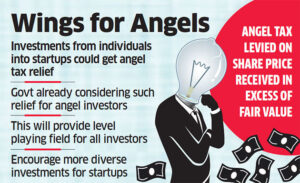
- The government has eased some of the provisions of the angel tax introduced in this year’s Budget on investments into startups by nonresident investors at a premium over their fair market value.
- As per a notification issued by the Central Board of Direct Taxes on Monday, Rule 11UA under the Income Tax Act has been amended, with some changes to the draft norms released in May, bringing some relief to prospective foreign investors.
- The introduction of five alternative valuation methods for the valuation of equity shares, which so far could only be valued based on NAV and Discounted Free Cash Flow methods, should provide more flexibility to merchant bankers for the valuation of a company.
Refresh to basics
Angel tax
- The provision known as the ‘angel tax’ was initially introduced in 2012 to discourage the generation and utilization of unaccounted money through investments in closely held companies.
- It is the tax that must be paid on the funds raised by unlisted companies through the issuance of shares in off-market transactions, if they exceed the fair market value of the company.
- Fair market value (FMV) is the price of an asset when buyer and seller have reasonable knowledge of it and are willing to trade without pressure.
Related Blogs…
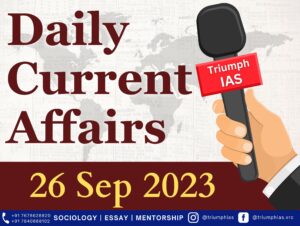 |
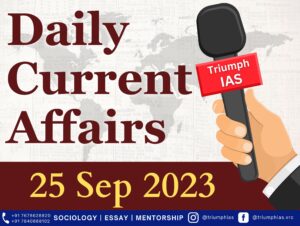 |
GS Related Practices Question…
To master these intricacies and fare well in the Sociology Optional Syllabus, aspiring sociologists might benefit from guidance by the Best Sociology Optional Teacher and participation in the Best Sociology Optional Coaching. These avenues provide comprehensive assistance, ensuring a solid understanding of sociology’s diverse methodologies and techniques.
Current affairs 27 September 2023, Current affairs 26 September 2023,Today news, Today news GS, Today news upsc, Today news and views, Today news 2023, Today news Current affairs September 2023, Current affairs news, Current affairs book pdf, Current affairs best blog, Current affairs for UPSC, Current affairs 2023, Current affairs contact, Current affairs book, Current affairs program meaning

Choose The Best Sociology Optional Teacher for IAS Preparation?
At the beginning of the journey for Civil Services Examination preparation, many students face a pivotal decision – selecting their optional subject. Questions such as “which optional subject is the best?” and “which optional subject is the most scoring?” frequently come to mind. Choosing the right optional subject, like choosing the best sociology optional teacher, is a subjective yet vital step that requires a thoughtful decision based on facts. A misstep in this crucial decision can indeed prove disastrous.
Ever since the exam pattern was revamped in 2013, the UPSC has eliminated the need for a second optional subject. Now, candidates have to choose only one optional subject for the UPSC Mains, which has two papers of 250 marks each. One of the compelling choices for many has been the sociology optional. However, it’s strongly advised to decide on your optional subject for mains well ahead of time to get sufficient time to complete the syllabus. After all, most students score similarly in General Studies Papers; it’s the score in the optional subject & essay that contributes significantly to the final selection.
“A sound strategy does not rely solely on the popular
Opinion of toppers or famous YouTubers cum teachers.”
It requires understanding one’s ability, interest, and the relevance of the subject, not just for the exam but also for life in general. Hence, when selecting the best sociology teacher, one must consider the usefulness of sociology optional coaching in General Studies, Essay, and Personality Test.
The choice of the optional subject should be based on objective criteria, such as the nature, scope, and size of the syllabus, uniformity and stability in the question pattern, relevance of the syllabic content in daily life in society, and the availability of study material and guidance. For example, choosing the best sociology optional coaching can ensure access to top-quality study materials and experienced teachers. Always remember, the approach of the UPSC optional subject differs from your academic studies of subjects. Therefore, before settling for sociology optional, you need to analyze the syllabus, previous years’ pattern, subject requirements (be it ideal, visionary, numerical, conceptual theoretical), and your comfort level with the subject.
This decision marks a critical point in your UPSC – CSE journey, potentially determining your success in a career in IAS/Civil Services. Therefore, it’s crucial to choose wisely, whether it’s the optional subject or the best sociology optional teacher. Always base your decision on accurate facts, and never let your emotional biases guide your choices. After all, the search for the best sociology optional coaching is about finding the perfect fit for your unique academic needs and aspirations.
To master these intricacies and fare well in the Sociology Optional Syllabus, aspiring sociologists might benefit from guidance by the Best Sociology Optional Teacher and participation in the Best Sociology Optional Coaching. These avenues provide comprehensive assistance, ensuring a solid understanding of sociology’s diverse methodologies and techniques. Sociology, Social theory, Best Sociology Optional Teacher, Best Sociology Optional Coaching, Sociology Optional Syllabus.
Best Sociology Optional Teacher, Sociology Syllabus, Sociology Optional, Sociology Optional Coaching, Best Sociology Optional Coaching, Best Sociology Teacher, Sociology Course, Sociology Teacher, Sociology Foundation, Sociology Foundation Course, Sociology Optional UPSC, Sociology for IAS,
Follow us :


https://t.me/VikashRanjanSociology
Find More Blogs
|
Scope of the subject and comparison with other social sciences |
|||
|
|
|
|
Modernity and social changes in Europe |

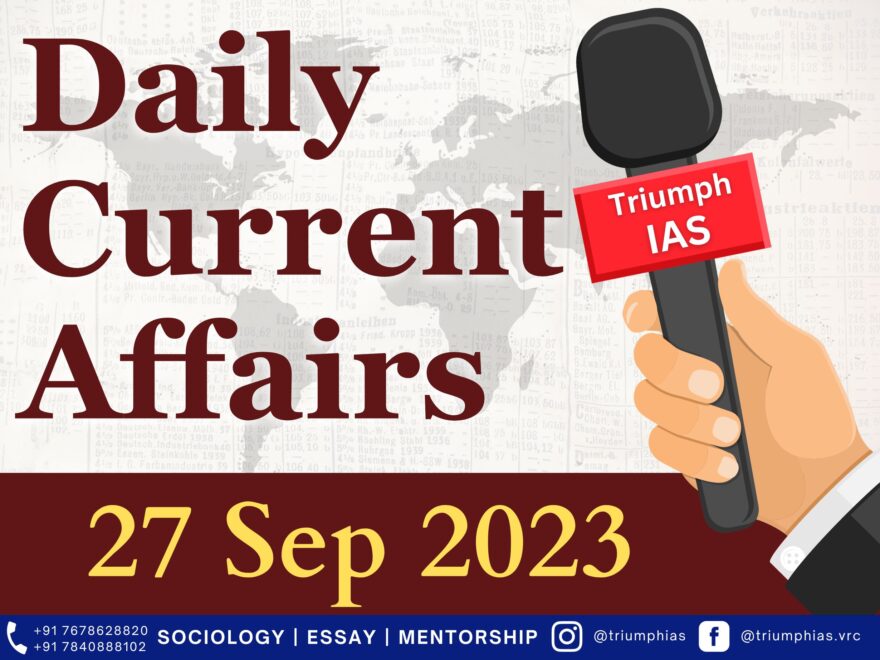
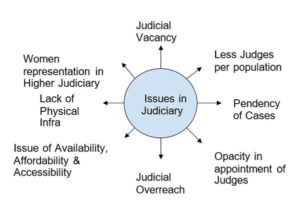
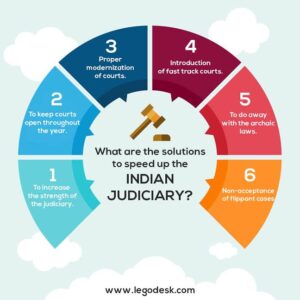
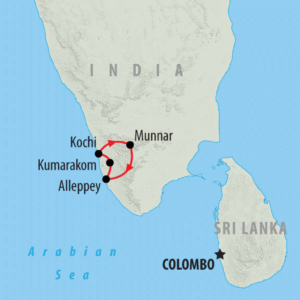
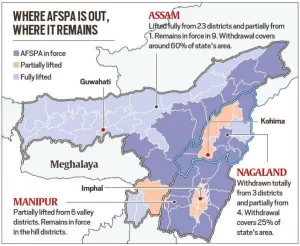
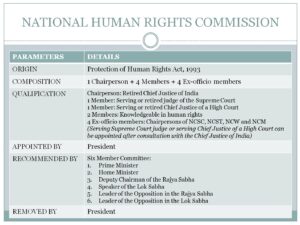
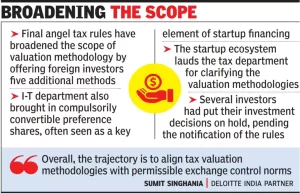
2 comments